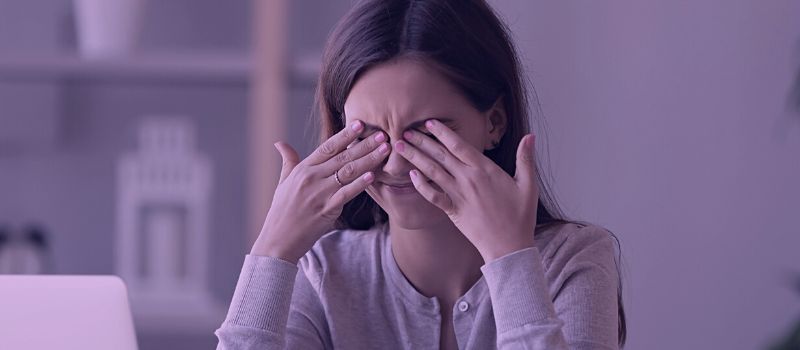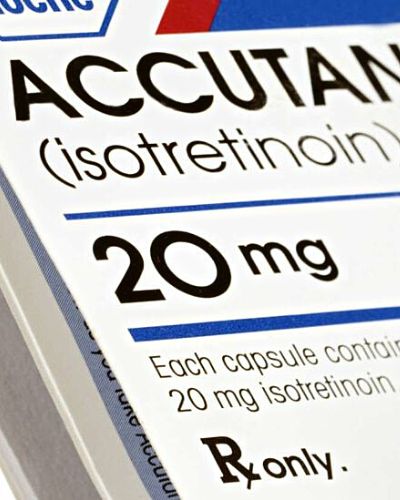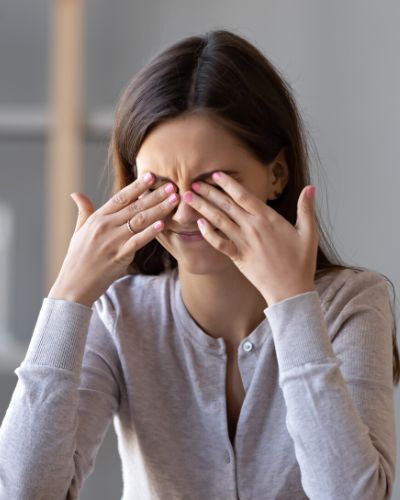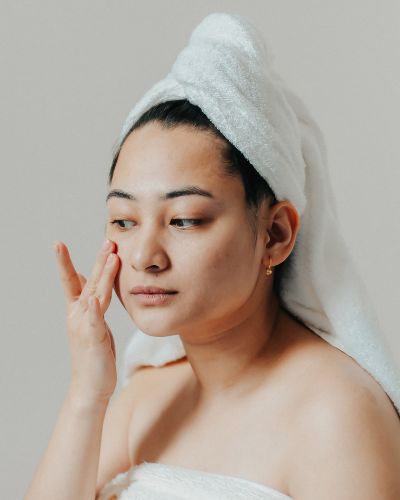Accutane is considered one of the most taxing medications for the body, which is why there’s a growing concern about whether it should be given to teenagers.
And since this is quite a controversial topic, I will share my opinion on whether Accutane is safe for teenagers, based on what I have gathered from reading numerous studies and articles.
However, don’t take this article as medical advice, as I am not a medical professional, so please consult your physician if you have any concerns.
With all that said, let’s start with the basics of understanding Accutane.

What is Accutane And What Does It Do?
Accutane is the brand name for the medication known as isotretinoin, an oral medication used to treat severe acne on the face and body.
It is also commonly prescribed to people whose acne has resisted previous treatments, such as benzoyl peroxide, adapalene, and antibiotics, as well as those dealing with severe acne in larger areas such as the chest and back.
The exact mechanism of action is unknown; however, it’s been observed that Accutane inhibits the function of the oil-producing glands by reducing the gland’s size.
Once the gland’s size is reduced, the gland will then produce less oil.
This can help acne since excess oil is essentially food for the acne-causing bacteria that live on the skin; therefore, lack of it will cause the bacteria to become starved, thus minimizing proliferation and eventually minimizing acne.
RELATED: Does Accutane Fix Oily Skin?
What Are The Side Effects of Accutane?
Despite its efficacy, Accutane is known to come with some unpleasant side effects, the most common ones including dry skin, chapped lips, and dry eyes.
Sometimes, people that are going through a long course of Accutane can experience joint pain, headaches, and hair loss, but these are rarer side effects that don’t happen to most people.
Another important thing to note about Accutane is that it’s also a teratogen, meaning it can cause birth defects in pregnant women.
Because of the potential risks associated with taking Accutane, the FDA has issued a black box warning for this medication.
A black box warning is the most serious type of warning that a medication can have, and it means that the medication is detailed as “extremely high risk” of “severe birth defects.”
For this reason, women who are taking Accutane must use two forms of contraception and take regular pregnancy tests to make sure they’re not pregnant while undergoing the medication and/or a couple of months after stopping it for precaution.
Additionally, Accutane can cause elevated liver enzymes in a small percentage of people who take it, which is why you should consider doing a liver enzyme panel (blood work) every month while you’re taking the medication so that your doctor can monitor your liver, especially if you drink alcohol.
RELATED: Is Accutane Bad For Athletes?
What Are the Requirements For Prescribing Accutane?

Accutane isn’t easy to get, as this medication falls under a special “restricted distribution program” to help reduce the risk of side effects.
This is why prescribers, patients, and even pharmacies (in the US) that carry this medication must be registered with the FDA-approved iPLEDGE program.
I’m not sure what terms and conditions apply for pharmacies in different countries in Europe; however, Accutane or Roaccutane is still considered a pretty serious medication that requires extensive monitoring and adequate approval.
To get prescribed Accutane, you have to consider that you will need a new prescription each month and that you can’t donate blood while taking this medication and for 30 days (or more, depending on your doctor’s guidance) after your last dose.
Anyone who can become pregnant is required to:
- Take monthly pregnancy tests.
- Use two forms of birth control (typically hormonal birth control pills, patches, or shots PLUS a barrier form such as a diaphragm or male latex condom.)
You can also consider committing to 100% abstinence from one month before starting isotretinoin until one month after the last dose, as this is definitely the most efficient method to avoid getting pregnant by accident.
The iPLEDGE program recommends that appropriate contraception decisions be made rather than pledge abstinence for anyone sexually active, even if they don’t currently have a partner.
Certain birth control pills, including the progesterone-only mini-pills, are not considered an acceptable form of birth control under the iPLEDGE program. Neither is using a female condom or the rhythm method.
RELATED: Can You Smoke While on Accutane?
Is Accutane Safe for Teenage Boys?
Now that we know some of the major potential side effects and risks associated with Accutane, it’s important to consider if this medication is actually safe for teenagers.
Generally speaking, Accutane is considered safe for teenage boys as long as they are monitored by a dermatologist or other healthcare professional while taking the medication.
That said, it’s important to note that there are no studies that have ever been done on children younger than 12 years old, and the studies that have been done on teenagers are reports that observe abnormal reactions reported by Accutane users.
And although it’s considered safe, this doesn’t mean that Accutane is the best treatment to go with, and you or your teenager should consider avoiding Accutane as much as possible, especially if you (or they) don’t have severe acne.
The most important thing to remember is that Accutane should only be a last resort after all other acne treatment options have failed.
If you or your teenager are considering taking Accutane, I will urge you to speak with a dermatologist about the risks and side effects associated with this medication, as well as other potential treatment options.
Additionally, if you are a teenager taking Accutane, you should especially observe the signs your body is sending you while taking the medication.
If, for some reason, you find that you can’t tolerate Accutane, be it due to excessive skin dryness, dry eyes, joint pain, fatigue, or any discomfort, it’s always a good idea to seek alternative treatment or a lower dose.
While Accutane may be an effective acne treatment, some people don’t think it’s worth the risk if other options are available.
RELATED: Is Accutane Good for Hormonal Acne?
Is Accutane Safe for Teenage Girls?

Again, Accutane is considered safe for teenage girls as long as they are monitored while taking the medication.
However, because teenage girls are more likely to experience some of the more serious side effects associated with Accutane, such as birth defects, it’s important to weigh the risks and benefits of taking this medication before making a decision.
As with teenage boys, there are no studies that have ever been done on children younger than 12 years old, and the studies that have actually been done on teenage girls are reports that observe abnormal reactions reported by Accutane users.
Additionally, and as I already mentioned above, everyone who can get pregnant has to take a birth control pill while taking Accutane and for one month after stopping the medication.
However, more and more studies are coming out about contraceptive pills being harmful to the female body, especially if taken for long periods of time.
The contraceptive pill depletes the body of a few essential vitamins, including zinc, magnesium, B vitamins, and selenium.
This can be harmful to the female body because these vitamins are essential for maintaining hormone balance, which is crucial for a woman’s health.
Additionally, due to hormonal imbalance, birth control pills can also lead to weight gain, hair loss, mood swings, anxiety, painful periods, and a host of other side effects, including inflammatory conditions such as acne (especially when you stop taking them after years of being on them.)
For these reasons, some people think that the risks of taking Accutane, especially for teenage girls, are just too high.
If you or your teenage daughter are considering taking Accutane, I will urge you to get thoroughly informed about its effects and evaluate whether it’s worth taking it.
In hindsight, perhaps doing a short Accutane course is better than taking birth control for years to maintain clear skin or antibiotics for more extended periods.
However, this is something that you’d have to decide on your own, considering everything I listed above.
On the other hand, if you decide to take Accutane, you should observe the signs your body is sending you while taking the medication.
If, for some reason, you find that you can’t tolerate Accutane, be it due to excessive skin dryness, dry eyes, joint pain, fatigue, or any discomfort, it’s always a good idea to seek alternative treatment or a lower dose.
While Accutane may be an effective acne treatment, some people don’t think it’s worth the risk if other options are available.
RELATED: Can You Get Botox While on Accutane?
How Severe Should Teenage Acne Be Before Considering Accutane?
Generally, doctors will only prescribe Accutane to patients with severe acne that has not responded to other treatment options.
So, if you’ve tried over-the-counter treatments, topical treatments, and antibiotics, but nothing seems to be working, your doctor may consider prescribing Accutane.
Accutane is also given to people with moderate or severe body acne as these are more challenging to treat with antibiotics and topical treatments.
Can Accutane Cause Depression in Teenagers?

Accutane is not a mood-altering medication; therefore, it shouldn’t affect the psychological state of a teenager.
However, due to the volatility and general moodiness that comes with hormonal overactivity during puberty and some serious side effects associated with Accutane, your doctor will probably advise you to be monitored or monitor your teenager for signs of depression while taking the medication.
There have been reports of patients (both teenagers and adults) experiencing depression and suicidal thoughts while taking Accutane, but existing studies have found no basis for a link between the medication and depression; therefore, it’s unclear whether the two are connected.
On the other hand, there are also reports that show a general improvement in the mental state and well-being of teenagers who have been struggling with low self-esteem, anxiety, and depression due to acne once they start seeing improvements in their skin after starting Accutane.
So basically, there are reports that confirm both improvements and decrease in the mental health of people (both teenagers and adults) who have taken Accutane.
This is why it’s so incredibly difficult to give a straightforward answer on whether this medication can cause depression or how often people get affected by this condition while taking Accutane.
What’s known is that Accutane works incredibly well for severe acne; however, the medication can be taxing for the body.
A few things that could help relieve some of these symptoms are having healthier lifestyle habits while taking Accutane, such as eating a nutritious diet, getting enough sleep, and exercising regularly.
These things might seem unimportant at first; however, a good antioxidant diet and good sleep will positively affect your cognitive function and lower stress and anxiety.
On the other hand, exercise can be a good way to turn your mind away from depressive thoughts and promote the production of endorphins, which are “feel-good” hormones.
It’s also crucial to have a support system in place while taking Accutane, whether that’s your parents, friends, or a therapist.
If you find yourself struggling while taking Accutane, please don’t hesitate to reach out for help because these side effects can easily go away when you switch the treatment or discontinue taking the medication completely.
Luckily Accutane’s side effects are temporary and usually don’t linger for a long time after stopping the medication.
RELATED: Does Accutane Cause Weight Gain?
Can Accutane Affect Development in Teenagers?
Accutane can have an effect on the development of bones and teeth in teenagers; however, these effects are usually not permanent and will go away after stopping the medication.
There have also been reports of teenagers experiencing slowed growth while taking Accutane; however, it’s unclear whether this is directly caused by the medication or not.
It’s important to note that these effects are usually only seen in people who take strong doses of Accutane for more extended periods, so if your teenager is only prescribed a short course of the medication, they probably won’t experience any development problems.
Can Accutane Interfere With Other Medication?
Although certain medications should not be used together at all, in some cases, two different medications may be used together even if an interaction might occur.
For example, Accutane shouldn’t be used with hormonal medication such as hormonal blockers, but it must be used with hormonal medications such as birth control, even though there is a higher potential of experiencing side effects.
Accutane also can be used with certain medications and can interfere with others, in which cases your doctor may want to change the dose, or other precautions may be necessary.
If you are about to start taking Accutane, your healthcare professional must know if you are taking any other medication, and even if they don’t ask (which they usually do), you should let them know your past and especially current medical record or other conditions you might be dealing with.
Here is a list of medications that are generally not recommended to be used with Accutane.
SN: You should also avoid doing any sort of dermaplaning whilst on Accutane.
Best Ways to Treat Acne in Teenagers

Keeping acne under control during puberty is important for maintaining self-esteem and preventing scarring.
However, it’s also a challenging thing to do, especially if you don’t take the right approach.
So with that said, here are three tips for treating acne and keeping this pesky condition under control during teenage years.
Good Skincare Routine
The first and most important step in keeping acne at bay is establishing a good skincare routine.
This means cleansing your face twice a day and using an acne-fighting toner or serum containing ingredients such as benzoyl peroxide or salicylic acid a few times a week.
In addition, it’s important to use a moisturizer to keep your skin hydrated, as well as using a sunscreen with an SPF of 30 or higher to protect your skin from sun damage.
Topical retinoids such as adapalene are also something to consider starting, as this is a great agent that will keep acne under control for a long time after the initial purging stage.
Great Hygiene
Acne-prone skin is especially susceptible to bacteria and other contaminants, so it’s important to practice good hygiene to prevent breakouts.
This means washing your face twice a day with a mild cleanser, avoiding touching your face, and always washing your hands before doing your skincare routine.
Teenagers should also avoid hairstyles such as fringes that constantly touch the face, as the dirt and oil from the hair can also lead to breakouts.
In addition, it’s important to change pillowcases often. When washing them, make sure to do it by using natural agents such as vinegar, as softeners or conditioners can often leave a greasy residue on the pillowcases that can irritate the skin when sleeping on them.
Lastly, you should also clean your phone screen regularly as this can also harbor bacteria that can cause breakouts.
RELATED: Best Shampoos for Accutane Users
Professional Treatments
Investing in professional treatments might be a bit of a financial stretch for a teenager, but it’s definitely something you should consider saving up for because there are a number of treatments that can be done to help improve and even fully get rid of acne.
Professional treatments such as chemical peels and light therapy are great for reducing inflammation, unclogging pores, and neutralizing the excess bacteria growth that’s causing the issue.
Additionally, a professional such as a dermatologist or an esthetician will be able to come up with a tailored skincare routine to address your specific skin concerns while taking your skin type and the current state of your skin into consideration.
This will help you maintain healthy skin instead of just masking the symptoms and potentially dealing with outbreaks in the future.
RELATED: How To Repair Skin Damage From Acne?

My name is Simone and I am a certified skin specialist. I created this website to teach my readers how to take great care of their skin and I also like to occasionally share my honest opinions on skincare products I’ve tried. You can learn more about me here.
